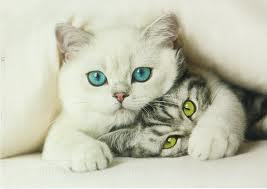Cardiac Disease in Cats
Will cause your cat’s heart to lose both its strength and tone
Cardiac disease in cats is definitely a condition that needs to be examined and watched for, as the results can be devastating to your cat.
This disease in your cat is a very broad term, as there are many types of conditions that may exist, but cardiac disease is used to describe any condition that may affect the heart.
WHAT IS CARDIAC DISEASE IN CATS ?
The conditions that affect the hearts in your feline can range from very mild, such as a heart murmur; to severe, such as cardiac arrest.
However, any form of cardiac disease is certainly something not to be treated lightly.
Congenital cardiac disease simply means that your cat was born with the conditions that exist, and acquired simply means that your pet develops some type of heart condition during the course of their lives.
This is a very serious subject and all possible conditions should be checked immediately by your veterinarian.
THE HEART IS DIFFERENT THEN OTHER ORGANS
The heart is organ that is different than any other organ in the body.
It is the center point. It is very muscular and it consists of four distinctive chambers:
A right and a left atrium and right and left ventricles. Values are located between these two chambers to help the blood flow properly.
When the blood does not flow properly, several things, all of them not good, could happen. Once this happens, the heart will start to malfunction.
Cardiac disease in cats is a situation the heart in your pet will be affected by one of the following: Dilated cardiomyopathy, hypertrophic cardiomyopathy, or restrictive cardiomyopathy.
The first, dilated cardiomyopathy is a disease that can best be characterized by a loss of muscle tone to the heart.
WHAT CAUSES IT ?
With Cardiac disease in cats, the heart will start to lose both its strength as well as its tone, will become enlarged, fills up with blood, and than is unable to contract the way it was intended to.
This has historically been the most diagnosed cardiac condition with cats, and some believe that it is genetically inherent in certain breeds such as Siamese, Burmese, and Abyssinian cats.
 Cardiac disease in cats has some very distinctive symptoms
Cardiac disease in cats has some very distinctive symptomsBut like most any diseases that you cat will face in their lives, proper diet adjustments and supplements have made this disease quite uncommon in cats.
The second, hypertrophic cardiomyopathy can best be described as a thickening of heart muscles which in turn has caused a decrease in the size of chambers in the heart.
The result of the form of Cardiac disease in cats is that the heart can not supply the needed blood to the body due to the decrease.
This is where hypertension can develop which could manifest in fluid in the lungs.
Abnormal heartbeats may than develop, which may lead to congestive heart failure.
THE WARNING SIGNS
The warning sings of this very dangerous condition are a difficulty in breathing, loss of appetite, vomiting, frequent collapses, and even sudden death.
Again, however, dietary changes and supplements can help, as treatment with this disease is very difficult.
In humans, it usually is a heart transplant.
In cats, it can be low sodium diets and supplements of aspirin, or atenelol, a medicine designed to treat angina or hypertension and to prevent clotting.
Restrictive cardiomyopathy is the third form of this disease in cats. Involving selected areas of the ventricles of the heart, scarring of the heart may be the result.
Scarring of the heart will result in contraction and than relaxation issues, which will ultimately lead to congestive heart failure.
This is considered by some experts as the biggest threat of this disease in cats. The signs of this disease closely resemble that of the first two.
Congestive heart failure will result in dilation of the chambers of the heart, and your cat will lose their appetite and as result start to rapidly lose weight.
They also face paralysis in their legs, blood clotting, and will have a very hard time in breathing properly.
This disease is probably the most difficult to try to treat for cats.
Low sodium diets will help, but cats with this form of cardiomyopathy usually only live for a period of 3 to 12 months.
MORE WARNINGS TO WATCH FOR
Signs to watch for with this form of Cardiac disease in cats are; coughing, especially at night when your cat is lying down, and shortness of breath when they even do the simplest of exercising.
Lethargy, weakness, and fainting are signs that your cat has a real problem, and you should immediately contact your veterinarian.
Treatment for this disease in cats will vary, depending on the types of disease and than the severity of the disease.
Summary
Some forms of this disease can be treated surgically, and than even with surgery, it will become a life-long managing process involving close monitoring.
Other conditions can be treated with diet.
Diet recommendations will also vary depending on the conditions, and only your veterinarian should make those decisions and recommendations.
Pet Medications and Cardiac Disease in Cats
Cat Vitamin Store
Heart Murmurs in Cats








